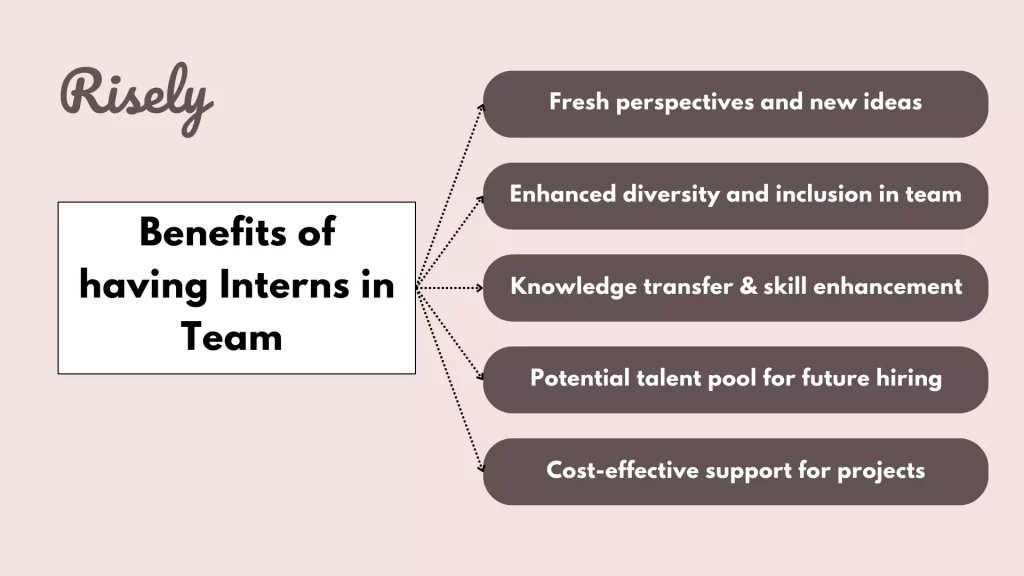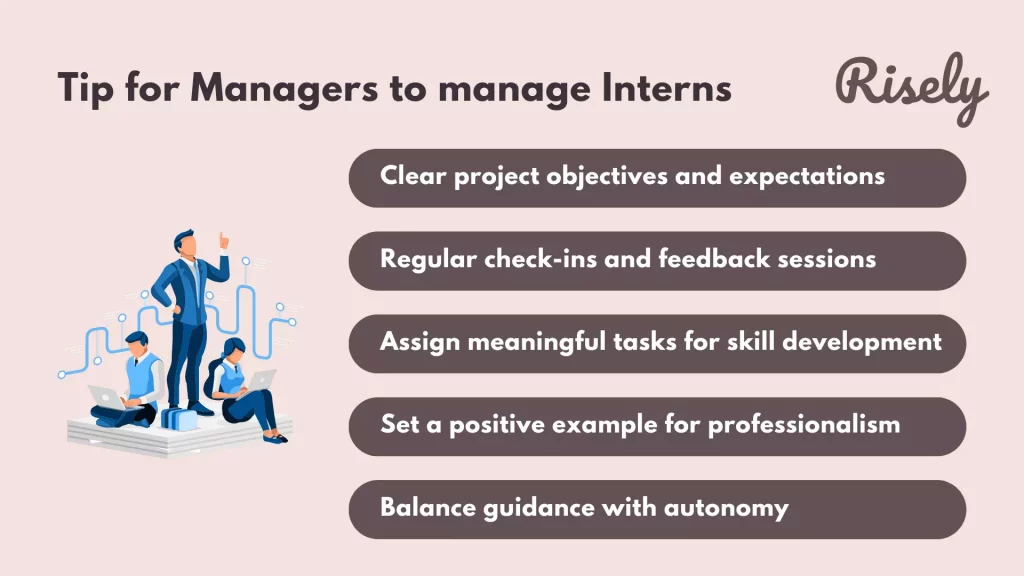How To Manage Interns? 7 Tips For Great Results
With the concept of internships being in full swing, managers need to know how interns can benefit their teams. By understanding the benefits that interns can provide and implementing the right tips to manage them effectively, managers can make the most out of this valuable resource. Whether you’re a new manager or an experienced one, read on for helpful advice on managing interns successfully!How do Internships Work?
Internships are a great way to gain experience in your desired field, learn new skills, and build relationships with influential professionals in your area. Internships offer an excellent opportunity for young professionals to get their feet wet in the industry before making the jump to a full-time job. People who opt for internships are usually college students or those looking for a field shift in their careers. Internships are an excellent way to start a professional journey and assess whether you are suitable for a particular field or not. Internships provide an essential stepping stone for career development and allow interns to network with professionals in their field. They can also help interns develop the skills and abilities to successfully pursue a career in that area. Many internships lead to full-time jobs, and some internships even come with good pay. Interns generally do the same work as regular employees, but they often have a more junior role in the company. But, even though they do the same work as regular employees, managing interns is significantly different from managing regular full-time employees. How? Let’s have a look over that in our next section.How is managing Interns different from managing full-time employees?
Several reasons make interns different from full-time employees, including:Interns are usually temporary
These interns are mostly college-going students, and they join these internships for specific periods (Summer or Winter break). Because of that, these interns are usually a temporary resource for an organization. For that reason, the way managers manage interns can not be the same as regular full-time employees.Interns are in-experienced
These interns are mostly fresh out of college, still in college, or new to the field. It means that they mostly lack professional experience in the area. That is also why managers cannot manage interns the same way they manage full-time employees. It requires managers to train them and build their skills according to the industry standards while giving them hands-on experience of the work in that field.They require Hand-holding
As these interns lack work experience, they mostly require handholding, and they might face challenges in making decisions, managing workload, and handling conflicts without proper guidance from the managers. That is also why working with interns is way different from managing regular full-time employees. Other than these differences, interns bring several benefits to the team they join. What are those benefits? Let’s discuss that in our next section.What benefits can interns bring to a team?

Interns are typically eager to learn, and this is an excellent trait for them to bring to a team
Interns are typically eager to learn and improve their skills, which is an excellent trait to bring to a team. They are usually motivated and keen to be self-sufficient, which can motivate the people they work with to aim for becoming self-sufficient too. These interns do not hesitate to accept that they want more knowledge or skills and are open to developing them, which can be a positive trait to add to your team.They can help to fill in the gaps in teams’ knowledge
The role of interns in an organization can be a great asset if handled correctly. Interns can help fill in the gaps in teams’ knowledge and act as a bridge between the existing workforce and new recruits. They can also help develop the organization’s brand and reputation and its recruiting strategy. Interns who are well-trained and handled correctly can be valuable resources for an organization and contribute to its success.By hiring and developing interns, you can assure your future talent pool
Hiring interns can be an excellent way to gain future talent for your company. Interns are typically young, enthusiastic, and untested, making them an ideal testing ground for new ideas and processes. By training and developing interns during the duration of the internship, you can instill the essential skills and knowledge that they will need to be successful in their professional lives. You can also assess their skills and give them feedback so that they can continue improving and developing their skills in the future. You get to build a valuable team member, but you also help ensure that your company has a strong pool of talent to draw on in the future. It will ultimately make the work of HR a lot easier.They are more likely to be familiar with the latest trends in the market
These interns are usually young, and they bring the Millennial or even Gen Z perspective to the team, which can be highly valuable. They are generally familiar with most social media platforms, know what their generation is interested in, know what can and is trending on social media, know what kind of content is engaging, and most importantly, know how to create that content. Interns can provide feedback on products and services, help develop new marketing campaigns and provide other insights that can help to improve the company’s performance. If managers put this knowledge to good use, it can benefit businesses.Hiring interns can also help to promote a company’s image and culture
Interns can bring much value beyond their fresh and unique talents to a company. By hiring interns, you promote your company’s image and culture. The market mostly sees interns as ambassadors for their companies, and as such, it is essential to make sure that they feel welcomed and appreciated. By hiring interns, you also show that you are supportive of the development of the next generation. It will create a highly positive image of your team in the market and help you build and grow relationships with various universities or educational institutes. It will enhance your ability to recruit other fresh talent and scholars from these universities and secure your future talent pool.They bring in new ideas and suggestions to your team while challenging your traditional ways
Interns are an invaluable asset to any team. They are young and full of energy, always looking to learn. They bring in new ideas and suggestions to your team, challenging your traditional ways of doing things. Interns can help you get out of your comfort zone, and they can help you see possibilities that you may have never thought of before. In this way, they help change how your team operates for good. They are also a source of fresh energy and enthusiasm, which can help boost your team’s morale.
How to manage interns? 8 Effective tips

Set expectations, guidelines, internship duration, etc. early on so there are no surprises later on
When hiring interns, the manager should set expectations from the get-go. They should set guidelines for the interns to follow during their internship duration, and that duration should also be pre-stated. These interns may be promoted to full-time employees within or after the internship, but it is still important to state a specific period to avoid any misunderstandings. This way, you can avoid any surprises or conflicts when the training is underway. Lastly, make sure to communicate with your interns regularly so that everyone knows what’s going on and remains on board with the internship plan. They can use email updates or team management systems for the same.Facilitate a warm welcome, introduction, and bonding activities between the interns and the team they’ll be working with
Ensuring that they feel welcomed and comfortable from the first day when managing interns is essential. It’s important that managers set the tone from the beginning. Managers can combine introductory activities such as a warm welcome, an introduction to the team, and bonding activities. Doing this will help create an atmosphere of trust and cooperation, which is essential for a successful internship experience. It will also be helpful if managers provide these interns with a mentor within their team. This mentor can be the direct senior of that intern or someone experienced in the role that the intern is trying to pursue. Mentorship can help interns stay away from any mistakes during the internship. These mentors can also act as a sounding board for the interns’ concerns.Use a team-oriented approach when assigning duties, instead of giving individual tasks to interns alone
To supervise or manage interns, it is essential to use a team-oriented approach instead of giving individual tasks to interns alone. It will help interns develop better teamwork skills and learn how to collaborate with other team members. They can also learn to work collectively and manage their time more effectively. Additionally, assigning duties in a team-oriented way will help interns better understand their responsibilities and how they fit into the big picture.Make sure your internship program is well-organized and allows interns to grow and learn
Managers need to create an effective internship program that offers valuable experience and skills and allows interns to grow and learn. Managers are responsible for training interns to be well in shape to pursue the career path they desire. By ensuring that your internship is well-organized, you will be able to provide the best possible environment for your interns to develop their skills and grow their knowledge. It will help them gain the learning experience they need to succeed in their future endeavors. Additionally, by ensuring a well-organized internship program, you will help your interns understand and adhere to workplace norms and procedures. In turn, this will allow them to become competent professionals. This way, you’ll be on your way to developing your future potential employees.Other Interesting Reads
Be patient with young professionals – they will make mistakes, but eventually, they’ll figure it out!
Internships are an excellent opportunity for young professionals to gain skills and experience in their chosen field. However, they can also be a challenging experience, as interns are often inexperienced and make mistakes. As a manager, it is essential to be patient with interns and provide instructions and guidance consistently. Managers should never forget that mistakes are a part of life. They are proof that interns are trying, and they can also be opportunities to learn. Therefore, managers should be lenient with their interns. It is also essential to give interns the space to learn and not impose too much pressure. In the end, internships will be worth it if managers can effectively manage their interns.Make time for one-on-one meetings with each intern to discuss their progress
It’s essential to take the time to manage your interns effectively, and one of the best ways to do this is by holding one-on-one meetings with them to discuss their progress. By having one-on-one check-ins with your interns, you can get a clear picture of their strengths and weaknesses and work on correcting any issues as early as possible. These regular check-ins will help you manage them better and ensure that they progress in the right direction. You can also ensure that they are learning the ropes of your company and are meeting all the necessary milestones.Make the best out of their unique knowledge
Interns are a valuable resource for any company, and managers should manage interns effectively to make the most of their unique skills and knowledge. One way to do this is to give interns specific tasks and projects that play to their strengths. For example, if an intern is particularly good at research, ask them to deep dive into a particular topic or sector. Or, if they have strong writing skills, ask them to draft blog posts or social media content. This way, your intern will be able to showcase and build on their strengths without feeling like they have been set at a task that doesn’t suit their skills.Never misuse their vulnerability
There is a reason why interns are often called “vulnerable.” They are new to the workforce and are trying to make a good impression. They may not feel comfortable challenging their manager or standing up for themselves if managers mistreat them, leaving them open to take advantage of. Managers should never misuse their power over interns, or it may create severe consequences for interns. These consequences may include emotional distress, loss of confidence, or even loss of faith in the job role, department, or even industry. Interns have the right to be treated with respect and should feel safe to voice any concerns they have. If they do not, they may leave the company with a negative view of it. That can compromise the team’s ability to hire in the future. It is especially required in the case of unpaid interns. It is okay if you are unwilling to pay salaries at the internship stage. But, you should at least cover the expenses they’ll bare to work for you.Conclusion
To conclude, managing interns can be a challenge. But, you can make the experience rewarding and productive with the right tips and strategies. By understanding the different benefits that interns can bring to your team and following the information listed above, you can set yourself up to facilitate successful internships. Next time you plan to hire interns for your team, make sure you follow these tips.Get the one-on-one meeting toolkit for effectively managing interns as well as employees
Get insights into one-on-one meetings and how to conduct them effectively for great relationships
FAQs
What are the key elements in supervising interns?
The key elements in supervising interns are:
– Providing training and development opportunities
– Exchanging feedback and working on it
– Creating a positive, enabling atmosphere for the intern
– Setting goals and monitoring progress
– Being available and approachable for guidance
– Providing training and development opportunities
– Exchanging feedback and working on it
– Creating a positive, enabling atmosphere for the intern
– Setting goals and monitoring progress
– Being available and approachable for guidance
How can I improve my internship supervision?
A few steps for becoming a better internship supervisor can be:
– Ensuring goals are set properly and as per the capacity of the intern
– Creating a wholesome on-boarding experience
– Guiding as needed while allowing opportunity to explore
– Becoming a coach to the intern
– Ensuring goals are set properly and as per the capacity of the intern
– Creating a wholesome on-boarding experience
– Guiding as needed while allowing opportunity to explore
– Becoming a coach to the intern
How do you motivate an intern?
A good way to motivate interns is through recognition of their efforts. As interns are young professionals who are stepping into the industry, getting recognition for their efforts would motivate them to perform better. Similarly, creating reward mechanisms in the team such as incentives can help too. A job opportunity after the training period can motivate them to perform better consistently too.
How do I mentor an intern?
To mentor an intern effectively, set the right expectations and pace of work from the get-go. As the internship progresses, enable them to access resources, ask questions, and test the existing notions in place. Moreover, build a relationship with them to understand their expectations from the role too. You can also have them shadow a senior team member to get some hands-on experience, Helping an intern achieve their goals through support and guidance is the key to being a good mentor.
Other Related Blogs
Building empathetic managers with Loren Sanders
Building Empathetic Managers with Loren Sanders Empathetic managers are the need of the hour as organizations are undergoing major changes including the introduction of AI into workflows and the threat…
Read this if you think you can run The Bear
Read this if you think you can run The Bear What if your favorite mom-and-pop deli is transformed into something high-end super quick? We are talking of The Bear, Carmy,…
When ‘Cooked’ Doesn’t Mean Dinner: A Manager’s Guide to Gen Z-Speak
When ‘Cooked’ Doesn’t Mean Dinner: A Manager’s Guide to Gen Z-Speak Are you unsure of what your team is talking about? Or yapping about, as they say? It’s not surprising.…
Can your team keep going without you?
Can your team keep going without you? What if you vanished? Alien abduction, probably. The method isn’t the matter here; it’s the impact. What if your team wakes up one…


